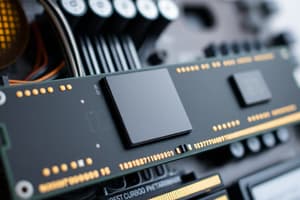Podcast
Questions and Answers
What is the function of a CPU in a computer system?
What is the function of a CPU in a computer system?
- Interpret and execute instructions (correct)
- Store data permanently
- Act as a temporary workspace
- Allow humans to interact with computers
Which storage device loses its contents when the computer is turned off?
Which storage device loses its contents when the computer is turned off?
- Solid State Drive (SSD)
- Hard Disk Drive (HDD)
- Optical Drive
- Random Access Memory (RAM) (correct)
What is the main function of storage devices like HDD and SSD?
What is the main function of storage devices like HDD and SSD?
- Execute instructions
- Hold information permanently (correct)
- Allow humans to interact with computers
- Act as temporary workspace
Which type of device allows users to convey information back from a computer system?
Which type of device allows users to convey information back from a computer system?
What is the function of the motherboard in a computer system?
What is the function of the motherboard in a computer system?
Which component is responsible for converting and regulating voltage for a computer's components?
Which component is responsible for converting and regulating voltage for a computer's components?
What is the purpose of adding expansion cards to a computer system?
What is the purpose of adding expansion cards to a computer system?
Which component is crucial to maintaining stable and reliable computer operation?
Which component is crucial to maintaining stable and reliable computer operation?
What software component starts up the computer, launches the operating system, and tests hardware for errors?
What software component starts up the computer, launches the operating system, and tests hardware for errors?
Which connectivity option allows for a wired internet connection in a computer?
Which connectivity option allows for a wired internet connection in a computer?
Flashcards are hidden until you start studying
Study Notes
Unleashing Computer Hardware: The Heart of Computing
From calculating your paycheck to guiding an interplanetary rover, computers have become an indispensable part of modern life. But what makes a computer tick? Let's delve into the realm of hardware, the physical components that power and enable these machines.
Central Processing Unit (CPU)
The CPU is often referred to as the brain of the computer. It executes instructions and performs calculations at incredible speed. The CPU interprets and executes a stream of instructions known as the program.
Memory (Random Access Memory, or RAM)
RAM, or volatile memory, acts as a temporary workspace for the CPU. When the CPU needs to access data or instructions, it fetches them from RAM. RAM is fast, but it loses its contents when the computer is turned off.
Storage (Hard Disk Drive, Solid State Drive, or Optical Drives)
Storage devices like HDD, SSD, and optical drives hold information permanently, allowing you to keep large amounts of data for long periods. HDDs are more affordable but slower compared to their SSD counterparts. Optical drives, like CD and DVD drives, are less common but still serve a niche purpose.
Input and Output Devices
Input devices allow humans to interact with computers. Keyboards, mice, and touchscreens are all examples of input devices. Output devices, like monitors, speakers, and printers, convey information back to the user.
Motherboard
The motherboard serves as the backbone of the computer, connecting the various components together and routing data signals between them. This circuit board contains slots for RAM and expansion cards, ports for input and output devices, and connectors for storage drives.
Expansion Cards and Peripherals
Expansion cards, like graphics cards, sound cards, and network cards, add extra functionality to the system. Peripherals, such as webcams, microphones, scanners, and external hard drives, can enhance the capabilities of the computer.
Power Supply Unit (PSU)
The PSU converts and regulates the voltage from the wall outlet to the specific voltages required by the computer's components. A good quality PSU is essential to a stable and reliable computer.
Cooling Systems
Computers generate heat during operation, so cooling systems are necessary to keep components within safe temperature limits. Fans, heat sinks, and liquid cooling systems all play a role in keeping your computer cool.
Operating System & BIOS
The operating system (OS) like Windows or macOS, and the basic input/output system (BIOS) are software components that manage the computer's hardware resources and provide a user interface. The BIOS starts up the computer, launches the OS, and tests the hardware for errors.
Connectivity: USB, Ethernet, Wi-Fi, and Bluetooth
Computers require connectivity to the outside world. USB ports allow you to connect peripherals like mice and external hard drives. Ethernet ports enable a wired internet connection. Wi-Fi and Bluetooth provide wireless connectivity.
"No Search" and Bing Chat
Bing Chat, a popular AI-powered search tool, recently introduced a feature that allows users to opt-out of web search results in their queries. This feature, denoted by adding "#no_search" to your query, is particularly useful when you need help with coding or math problems, where external search results might not be relevant.
With a deep understanding of computer hardware, you can appreciate the complexity and capabilities of modern computing. From the CPU that manages information to the cooling systems that maintain stability, computer hardware is the key to unlocking the potential of our digital world.
Studying That Suits You
Use AI to generate personalized quizzes and flashcards to suit your learning preferences.




